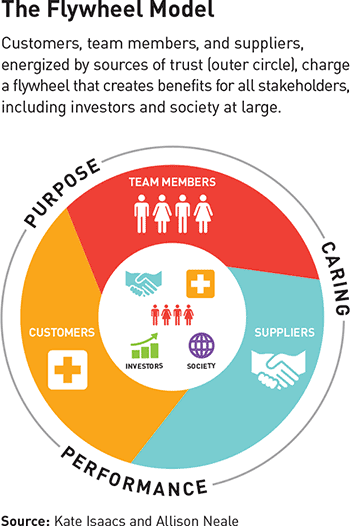The Flywheel Philosophy
Companies are embracing stakeholder value to produce results.
The prevailing business model of shareholder value maximization is coming under fire. Former General Electric CEO Jack Welch famously called it “the dumbest idea in the world; shareholder value is a result, not a strategy.” BlackRock CEO Larry Fink dropped a bombshell on the investor world with his 2018 letter to CEOs urging companies to embrace a purpose-driven strategy that delivers financial performance and creates long-term value for stakeholders and society.
A recent paper by two Harvard Business School professors makes the same point. The job of CEOs and boards should be guiding firms to create long-term value for all stakeholders: customers, investors, employees, suppliers, and society at large. Many leading business strategists, including Michael Porter, Michael Jensen, and Roger Martin, are sounding the call that a purpose-driven, long-term approach to creating stakeholder and social value is the new model of business. It is also a topic of research and interest at the Center for Higher Ambition Leadership, where academic researchers and practitioners (including the authors of this article) come together to advance these ideas.
In pursuing such a strategy, companies can seek to harness the power potential of a significant source of energy: stakeholder partnerships. Doing so requires designing a system that efficiently stores and dispenses the energy that is generated by a company’s major constituents — a flywheel, to continue the analogy. A flywheel is a device that transforms diverse energy inputs into a constant output of productive power. Think of the potter’s wheel, spinning at a steady clip as the potter pumped the machine’s foot pedal. Building a stakeholder flywheel requires aligning a firm’s purpose, strategy, culture, and executional capacities so that stakeholders are willing and able to contribute their time, energy, and passion to the enterprise.
Healthcare solutions company Henry Schein, whose experience we discuss here, provides an effective illustration of how stakeholder partnerships can produce a flywheel effect. Led since 1989 by Stanley Bergman, Henry Schein is a Fortune 300 firm that provides business, clinical, technology, and supply chain solutions to healthcare professionals around the world. Over the past 10 years, Henry Schein posted an average annual total shareholder return of more than 11 percent, and an average annual earnings per share growth rate of almost 11 percent. Since the company’s 1995 initial public offering, the stock has returned more than 1,800 percent.
A simple idea stands at the core of Henry Schein’s strategy: Create the conditions for the company’s stakeholders to generate shared value through long-term, innovation-oriented partnerships. Henry Schein regards its partnership model as the secret behind its success in a competitive and highly commoditized industry. “There are absolutely no barriers to entry into 90 percent of our business,” says Bergman. “So why are we successful? Because we balance the needs of all our constituents, and we build deep trust with and among them.” The ways in which Henry Schein creates this trust-based environment are relevant for every business.
Trust-Based Partnerships
Very often, the relationships connecting businesses with their customers and shareholders are self-interested, short-term, and impersonal — in other words, transactional. In contrast, Henry Schein regards long-term, trust-based stakeholder partnerships as the key driver for shareholder value and the capacity for reinvention and innovation. The table below summarizes the contrasting qualities of the two models.
Trust is the source of energy that charges the flywheel and keeps it spinning for the benefit of all major stakeholder groups. Henry Schein has consciously built its strategy, culture, and executional capacities to support three pillars of trust: performance, caring, and purpose. These in turn drive partnerships with the three stakeholder groups at the core of Henry Schein’s value-creation engine: customers, employees (known as “Team Schein members,” or TSMs), and suppliers. In this model, depicted in “The Flywheel Model,” value creation for investors and society at large is an output or by-product.
Trusting to perform. Henry Schein makes an explicit link between results and trust. With investors, company leaders communicate the stakeholder business model and set financial expectations that they believe they can meet. “Wall Street is important, but they are just one of five constituents that we carefully balance,” says Bergman.
With customers, trust takes a long time to earn but just a moment to lose. “We are the last people to see an order before our customer opens it up,” says Paul Rose, senior vice president of global supply chain at Henry Schein. “If we do something wrong, all of the good work that has been done by all of the business teams will be lost.” As a result, supply chain team members are trained to think about customers first and profits second. The company constantly monitors service quality through surveys, focus groups, and statistical reports, and works to improve the customer experience. In 2017, 97 percent of customers rated their overall satisfaction as excellent or good in the company’s annual survey.
Trusting to care. The next layer of trust relates to caring: genuine caring for the interests of stakeholders that goes beyond a basic business relationship. This is expressed, for example, through efforts to ensure that employees feel valued as real partners. “In practice it is simple,” says Gerry Benjamin, executive vice president and chief administrative officer. “Treat people the way you want to be treated. Treat everyone as equals.”
To promote and strengthen the culture, in addition to holiday parties and company picnics, the Team Schein and the community services division organizes wellness programs and recognizes team members who exemplify the company’s culture and spirit with awards. It holds theme days, when the team can dress as anything from superheroes to movie characters, and organizes surprise visits from an ice cream truck. Its community engagement programs include back-to-school and holiday events for children, which afford team members the opportunity to provide underserved children with new clothes and school supplies.
Caring is also extended to customers. In the aftermath of the 2017 hurricanes Harvey, Irma, and Maria, Henry Schein established relief funds with matching corporate and employee donations to support local NGOs. The company also convened a Road to Recovery summit to help educate customers about financing, insurance claims, disaster recovery, and mental wellness, and to otherwise help them get back on their feet. Dolores Mora, a dental customer in Houston, repeatedly asked her sales representative for help. “Any time I turned to [my rep],” she says, “anything I asked for, they already had it in place.”
Trusting in purpose. Recent research shows that higher purpose translates into better financial performance, but simply articulating that purpose isn’t enough. A company’s purpose must also be clear and understandable to employees. Henry Schein’s culture survey, administered every other year, shows strong performance on both meaningful purpose and clarity of purpose. In 2017, the two top-scoring survey categories were engagement (measured in terms of pride, being energized by one’s job, and feeling confident in the company’s future) and alignment (measured in terms of people’s understanding of the company’s goals and how to link their efforts to those goals). According to the survey administrator, which conducts surveys for a quarter of Fortune’s “Most Admired Companies,” Henry Schein’s results exceeded the average of high-performing global companies in the categories of engagement and alignment. The high level of engagement, combined with support and training, empowers TSMs to create trust-based partnerships with customers and suppliers.
The company motivates employees in part through a far-reaching meta-goal called Helping Health Happen. A meta-goal is a purpose larger than the profit motive, one that cannot be attained fully without a number of organizations working together. Companies that establish meta-goals can draw in diverse stakeholder groups to collaborate on a common agenda that creates social value in which the business can also share.
One of the company’s meta-goals is to enhance health and well-being for people in need around the globe, which it pursues through a program called Henry Schein Cares. The company focuses on societal issues that its stakeholders care deeply about, that align with its strategy, and that leverage its core competencies — for example, bringing strong supply chain delivery capabilities into partnerships with its team members, customers, and supplier partners. Henry Schein Cares programs include catalyzing pro bono dental care for children in need and providing free health screenings at community health fairs.
Building Trust-Based Partnerships
Henry Schein creates and sustains trust-based partnerships with its constituencies by designing and communicating purpose, strategy, culture, and executional capacities to engage the hearts and minds of its people and empower them to form partnerships with customers and suppliers.
Partnering with employees. According to Gallup, the share of “engaged” employees in U.S. companies hovers at about one-third. There are four key elements of Henry Schein’s approach to engagement, which touch on the core drivers (see box).
Research has identified a handful of core drivers that are consistently linked to high levels of engagement. These include an environment in which people feel they can autonomously make decisions, achieve personal goals, and make good use of their skills and abilities; a positive culture that cares for people through fair feedback and recognition; a balance of work and family life; opportunities for growth and development; pride in the company’s purpose; trust in the company’s leaders to model core values; and clarity with respect to strategy, goals, and objectives.
Fostering a partnership culture. The idea of partnership begins with corporate language; people are not employees, but rather team members, and are explicitly viewed as partners in value creation. Because TSMs work in a company culture that emphasizes trust, they are encouraged to form stakeholder relationships that feature high trust and shared values. Leadership and training programs are specifically designed to help team members connect their work to the company’s strategy and higher purpose. The company also offers a wide range of volunteer opportunities. In 2017, more than one-quarter of the workforce participated in more than 225 diverse volunteer programs.
Frequent communication and engagement with top leaders. To help TSMs understand and feel connected to the company’s purpose and the idea of forming trust-based partnerships, Bergman and other senior leaders present at Henry Schein’s facilities annually on the company’s progress and strategy, as well as its culture, values, and commitment to society. At every visit, Bergman convenes roundtable meetings with TSMs chosen at random from all levels of the company. Doing so “gets people out of their daily routine and into a reflective mode,” Bergman notes. “This is where we can really find out what the team feels is going well and where there are challenges so we can make changes as needed quickly.”
Exceptional wellness programs. Henry Schein offers a comprehensive wellness program to TSMs, bringing in health professionals to offer care, including on-site mammograms, oral cancer screenings, hearing tests, cardiovascular screenings, and blood tests for diabetes. In 2017, nearly 50 percent of the workforce participated in 100 separate wellness programs across the company, substantially higher than the median participation rate of 30 percent for disease management programs cited by the National Worksite Health Promotion Surveys.
Reverse mentoring. In 2016, the company established a reverse mentoring program to pair high-potential young talent with more seasoned TSMs in order to foster an exchange of ideas across generations and, ultimately, make the firm more appealing to millennials. “One of our young millennials came in and gave me all sorts of ideas [for how] to go paperless in my office,” says Lorelei McGlynn, senior vice president and chief human resources officer. “She told me how to engage team members better from her perspective, ideas to change how we track time worked, and norms around not emailing people during time that they feel is family time.”
Partnering with customers. Henry Schein seeks to uphold trust in performance with systems to ensure superior customer service. The company ships products from strategically located distribution centers, and inventory levels are managed daily with the aid of management information systems. An average of nearly 200,000 packages are shipped every day, and approximately 99 percent of items ordered are shipped without back-ordering on the same day the order is received.
Beyond maintaining high-performance supply chain practices, Henry Schein works hard to demonstrate that it cares about its customers — for example, by soliciting their feedback. Field sales TSMs should regard their role as helping their customers run their businesses more effectively. So they are trained to review an entire medical, dental, or veterinary practice and find ways to help customers improve efficiency, productivity, and profitability. This includes the provision of healthcare supplies, equipment, and digital technology and back-office solutions such as practice management software.
In 2016, the company established a reverse mentoring program to foster an exchange of ideas across generations and, ultimately, make the firm more appealing to millennials.
Henry Schein’s commitment to a larger purpose plays out in a particular way with customers who engage in the company’s corporate citizenship work. One of the longest-running programs it is involved with, Give Kids A Smile, has served more than 5.5 million children through the volunteer services of dentists. “While we do not do this work for business gain, we have seen that there is a business value of our field reps participating in these social responsibility programs,” says Steven W. Kess, vice president of global professional relations. “They are standing shoulder to shoulder with our customers, and they have conversations with our dentists, our physicians, and our veterinarians. Then the next time that sales rep goes into the office, it’s a completely different relationship with that customer.” On average, customers who participate in the Give Kids A Smile program purchase 10 percent more in products and services than those who don’t participate. Likewise, the company found that those universities that participate in its Global Student Outreach program (through which oral care products are donated in support of dental student missions) increased their year-over-year business with the company at more than twice the rate of the average dental school customer.
Partnering with suppliers. Cost-effective purchasing is a key element in maintaining and enhancing the company’s position as a competitively priced provider of healthcare products and supplier partner. Henry Schein’s goal, however, is to move beyond a transactional relationship with its suppliers. “We want to be the best company for them to do business with, giving them the best price, and making sure we are their best pathway to get their product in front of the customer,” said Maureen Knott, Henry Schein’s vice president of product advertising and marketing.
Like other companies in the field, Henry Schein continuously evaluates purchase requirements and suppliers’ offerings and prices in order to obtain products at the lowest possible cost. It also invests to support its suppliers in most effectively marketing their products. For instance, the company hosts a three-day off-site meeting for suppliers every year, which focuses on developing budgets, marketing plans, and product launch calendars. The company also provides suppliers with a comprehensive media kit that contains a guide to help them identify a menu of available marketing programs, specs for advertisements, deadlines, and rates. Finally, whereas most of the industry works on a lead time of 30 to 60 days, which is too short in many cases for adequate planning, Henry Schein uses a 90-day lead time with suppliers.
Suppliers are also invited to participate in the higher-purpose dimension of Schein’s business. Give Kids A Smile, founded in 2002, is a nationwide program involving the American Dental Association, Henry Schein, and two of the company’s supplier partners, Colgate-Palmolive and KaVo Kerr. Suppliers have donated more than US$15 million in products to the program, enabling participating volunteer dentists to provide free oral health services for more than 5.5 million children across the United States.
Concern for Results
The difference between the classic shareholder approach to business and a stakeholder-partnership model is that the financials alone don’t drive the enterprise. Rather, they are balanced with a company’s cardinal concern for people — its workers, customers, suppliers, and the patients who ultimately benefit.
The flywheel approach, a holistic system of meaningful purpose, culture, and execution capabilities, depends on trust inputs from all stakeholders, and generates a steady output of trust that, in turn, throws off value in all directions. But to embrace this approach, companies must be sincere. Without authenticity, the energy in the flywheel dissipates quickly. And companies have to work hard at it. “Make an environment where people like to work and have everybody working together for the betterment of the customer,” Bergman told Chief Executive last year, summarizing the formula for success. “It sounds easy. It’s not easy. The execution is difficult.”
Author profiles:
- Kate Isaacs is a research fellow at the MIT Sloan Leadership Center and an executive fellow at the Center for Higher Ambition Leadership.
- Allison Neale is the director of public policy at Henry Schein Inc.





